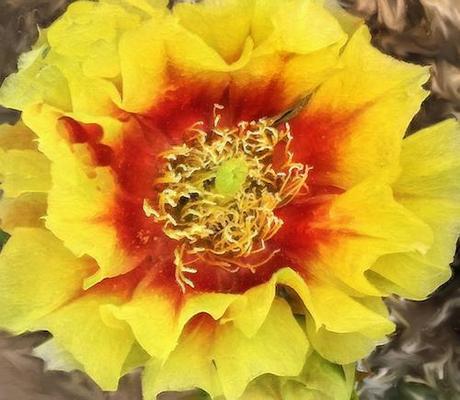
Cactus Bloom © lynette sheppard
Mary Tagliaferri MD shared this plain talk guest post with us. I had the pleasure of interviewing “Dr. Tags” recently – and found a new goddess sister! As an MD with a Master’s in Oriental Medicine, she bridges the gulf between Eastern and Western medicine approaches. Most important, she has conducted research for the last 20 odd years on plant based natural remedies. You can find her Menopause formula on her website: drtags.com. She sent me some to try – and now I don’t know how I got by without it. Enjoy her special brand of wisdom here:
Demystifying the Relationship Between Soy and Breast Cancer
Women with a history of breast cancer often asked me if it’s safe to eat soy products. Soy products include simple soybeans (edamame), or manufactured forms such as miso soup, tempeh and tofu. Some breast cancer specialists tell their patients to avoid soy products since they’re “estrogenic,” meaning they contain estrogens. A woman’s breast cancer may be of the estrogen-responsive type, meaning that estrogen “docks” on the tumor cells and causes breast tumor growth. The estrogen in soy is a phyto-estrogen (phyto means plant-based). Phytoestrogens can sometimes act as estrogens in our bodies, but they do not stimulate breast cancer associated tumor.
I’m always amazed when I hear that medical professionals continue to be confused on this topic. Most physicians work very hard to keep abreast of the latest medical findings, but somehow the “soy issue” slips through the educational cracks.
What we know about soy from other cultures
Japanese women have one-third the amount of breast cancer when compared to American women. However, when Japanese women move to the US, the first generation of their offspring has the same rate of breast cancer as American women! Since a person’s genetic lineage can’t change within one generation (with very rare exceptions in the form of mutations), that leaves the person’s environment at cause. The Western diet, a culprit in so many “diseases of affluence” (diseases prevalent in First World countries), is again partly to blame for the phenomenon. Thanks to our American appetites, we now have a 1 in 8 lifetime risk for breast cancer, and the disease is the second leading cause of cancer death.
When I had breast cancer at the young age of 30, I was a die-hard tofu fan. I wanted to know if I would be able to continue eating a staple of my diet and started digging into the medical literature. My research led me to write a chapter about soy in Breast Cancer: Beyond Convention, a book I edited about complementary and alternative practices in the treatment of breast cancer.
What I’d found was this:
Soy intake in an amount consistent with a traditional Japanese diet (2-3 servings daily, containing 25-50 mg isoflavones) has been shown to be protective against breast cancer and breast cancer recurrence.
Soy does not increase circulating estrogen levels in the body or affect estrogen-responsive tumor tissues.
Women with a history of breast cancer who are taking tamoxifen and eating soy do not have an increased risk of breast cancer recurrence.
How not to eat soy
The temptation in our American culture is to take a food known to have healthful properties, process it into high-dose pills, and pop a few of those capsules when we feel like we need a boost. We’ve done it with fish oil, red wine antioxidants, mushrooms, garlic, and so on. Sometimes this approach works, when done in a measured and thoughtful way (think of the complex and ingenious combinations of herbs in Traditional Chinese Medicine formulas). Most of the time, though, we overdose on one specific chemical compound in that food, without really knowing how it will affect us in the long run. I would caution anyone (not just breast cancer patients or survivors) against the use of high-dose soy supplements, since large amounts of soy phytoestrogens could be unsafe.
How to enjoy your soy
Have those 2-3 servings daily, since they’ve been shown not to cause harm and to possibly be protective against breast cancer development and breast cancer recurrence. Cultivated or fermented soy products like miso paste and tempeh may be easier to digest than plain soybeans or tofu. If you’re currently undergoing treatment for breast cancer, please discuss any soy use with your doctor first.
Enjoy your soy, eat it with peace of mind, knowing that it can be a part of a healthy diet before and after breast cancer.

